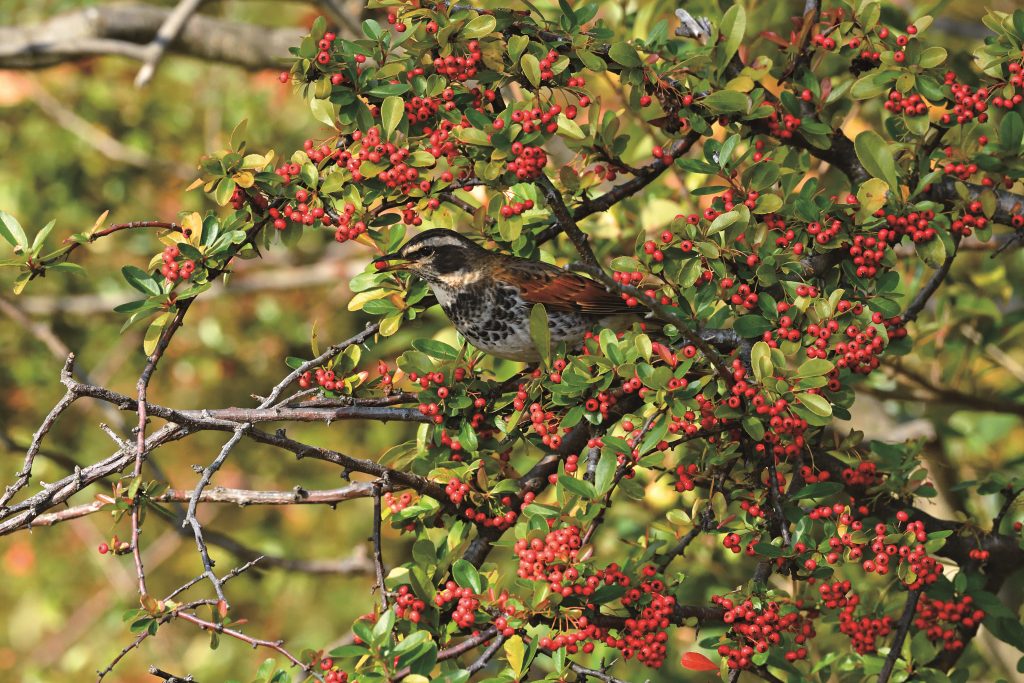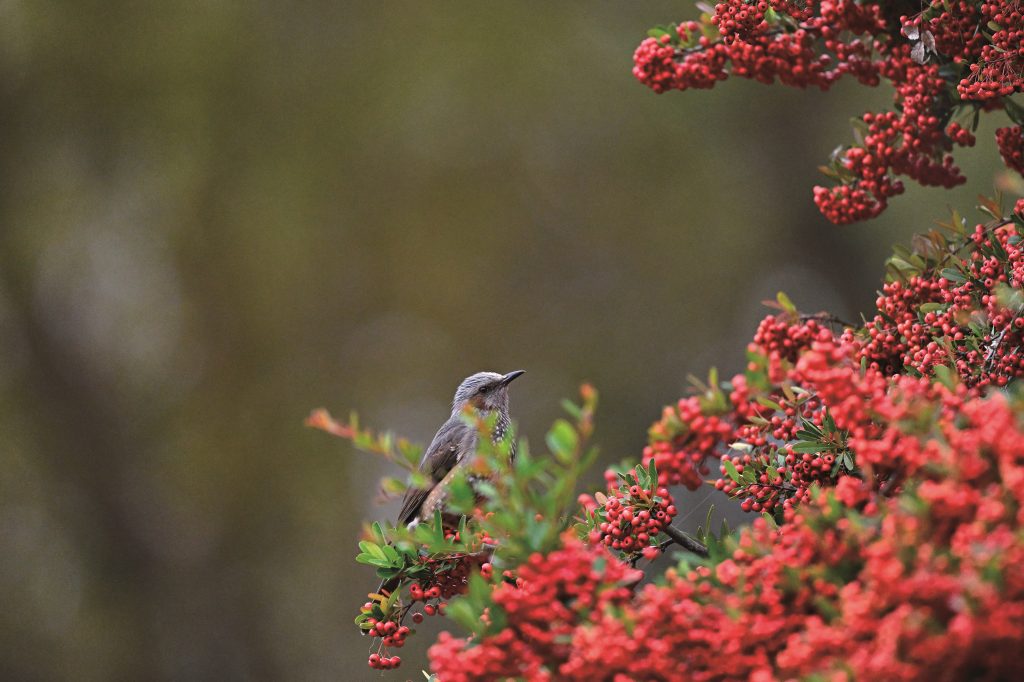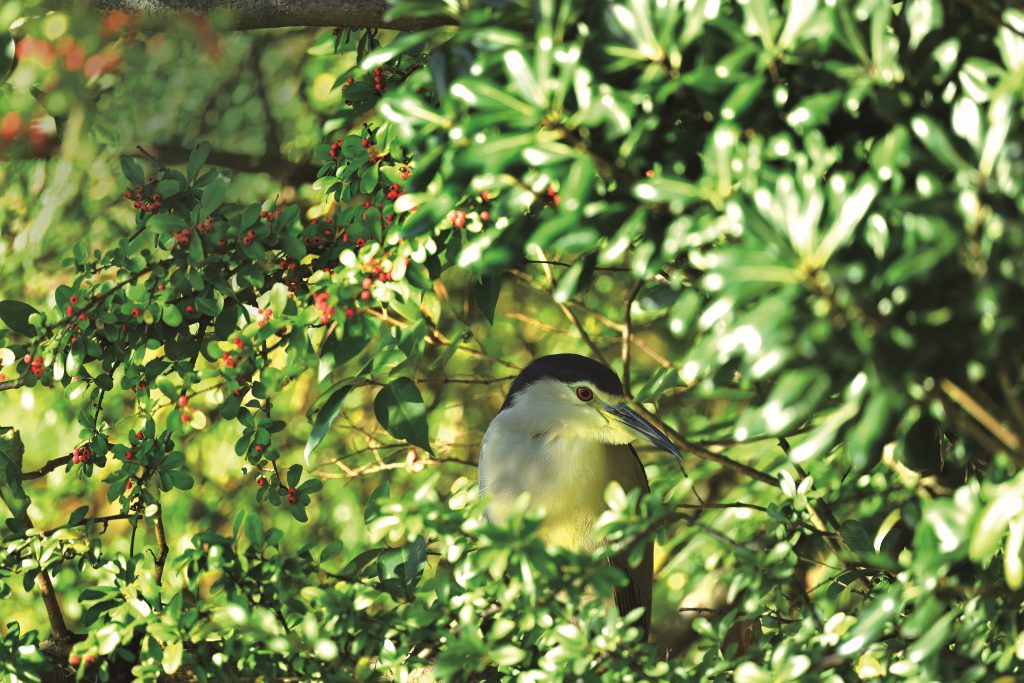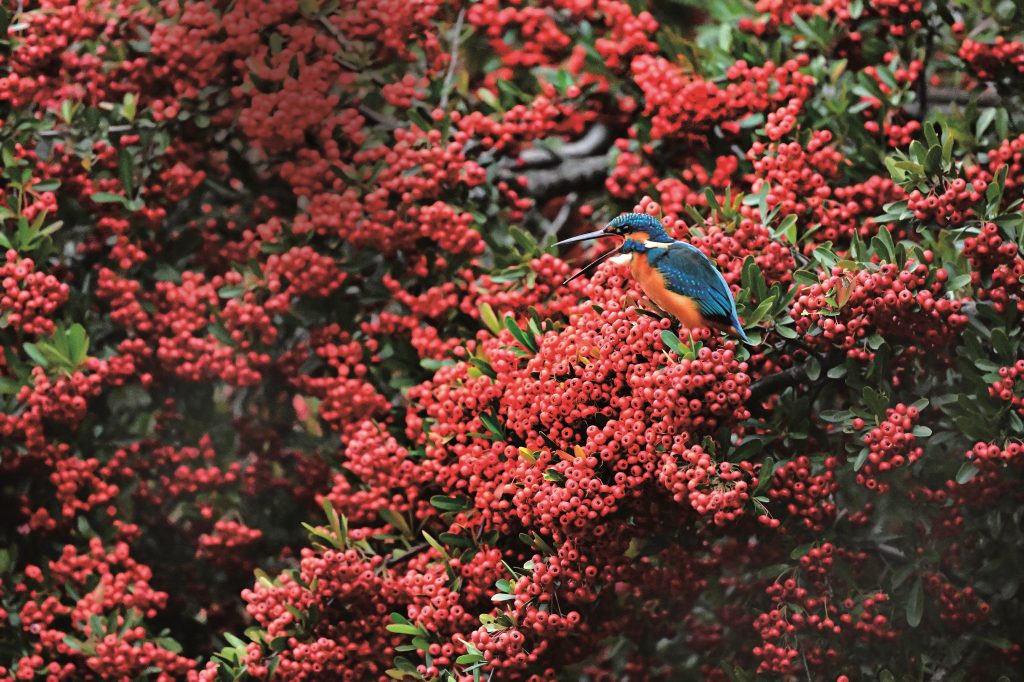Birds that revenue from Pyracantha
“By the use of the Lens” Fujingahou Journal, December, 2024
Images and textual content material by HIH Princess Takamado
Image edited by Koichi Fujiwara (NATURE’S PLANET)
Edited by Yuki Masuda (Fujingahou)
As a result of the yard’s hues develop dreary with the onset of winter, the colourful berries of Pyracantha enrich the panorama all through Asia. Since that’s the season as soon as we usually see Holly and fowl motifs as Christmas decorations, I want to take this opportunity to level out you some images of Pyracantha pink berries and birds.

24cm Family: Turdidae
This species breeds from northern Siberia to the Kamchatka Peninsula. All through winter, it migrates to the Korean Peninsula, Japan, Taiwan, and southern China.
In Japan, it is a widespread winter fowl found nationwide. In autumn, it arrives in flocks in mountainous forests, usually shifting to open areas resembling fields and riverbanks by the use of spring.
Every images on this internet web page current birds consuming berries. The {photograph} above is of a Dusky Thrush consuming a Pyracantha berry. These birds migrate prolonged distances from Siberia throughout the fall for the fruits which might be obtainable in abundance throughout the hotter areas of Japan. In spring, as well as they feed on bugs.
The {photograph} beneath is of a Brown-eared Bulbul. In winter, they feed totally on Pyracantha and completely different berries. They seem to need sweet meals resembling fruits and nectar, nevertheless are generally seen boldly consuming complete flowers, shoots, leaves, and bugs. Although acquainted to Japanese birders, it is a very unusual and trendy fowl amongst worldwide birders.


27.5cm Family: Pycnonotidae
This species is distributed in restricted areas, along with Japan, Sakhalin, the Korean Peninsula, Taiwan, and the Philippines.
In Japan, it is usually seen, nevertheless its inhabitants is smaller in neighboring worldwide areas. All through winter, birds from northern areas migrate south to overwinter.


58-65cm Family: Ardeidae
Broadly distributed all through quite a lot of the world, along with into Japan. It is a resident fowl all-year-round.
The {photograph} above is a Black-crowned Evening time-Heron – I was truly shocked after I found it! They’re nocturnal, so that they need to have settled all the best way all the way down to sleep in a helpful tree sooner than the park opened. It was sleeping soundly with its beak tucked beneath its wing, unnoticed by anyone nevertheless the birders, subsequent to a bridge the place many people transfer. The {photograph} was taken when the fowl was startled by the loud voices of kindergartners working earlier and opened its eyes.


17cm Family: Alcedinidae
The distribution ranges from southern and central Europe to Japan excluding the Himalayan space all through the central and southern areas of the Eurasian continent.
Northern populations migrate all through winter to areas resembling northern Africa and Indonesia.
In Japan, it is a resident fowl usually found near watersides all through the nation, nevertheless it is a summer season fowl in Hokkaido.
The ultimate {photograph} is of a Widespread Kingfisher; it is swallowing a caught fish and attempting to spit out the undigested bones. Other than this very second of the {photograph} when it opened its mouth giant, it was so nonetheless and motionless that I questioned if it was nonetheless alive. The kingfisher used the Pyracantha to not eat the berries, nevertheless as an excellent perch from which to give attention to fish throughout the pond. The plant was bursting with an plentiful harvest this 12 months, and even the brightly coloured kingfishers generally misplaced their place. Whether or not it’s troublesome for the fish throughout the pond to see it, it proves to be helpful for these birds. They may have decided to perch among the many many berries for camouflage.
Pyracantha was launched to Japan in the middle of the Meiji interval (1868-1912). The species that bears pink berries is native to southern Europe and western Asia and known as ‘Tokiwa-Sanzashi‘ in Japan. In Japanese, ’Tokiwa’ means ’unchanging’ or ‘evergreen’ , coming from the reality that its leaves are always inexperienced. The species which bear orange-coloured berries originate from southwestern China and its Japanese determine is ’Tachibana-Modoki’. In Japanese, ’Tachibana’ is a tree throughout the Rutaceae family that bears orange-toned fruit and ’Modiki’ means ’pseudo’. It is acknowledged that it was planted as a hedge to forestall crime on account of it is evergreen and has many thorns.
When berries and nuts ripen in late fall and winter, birds are involved in them. Lots of the berries found throughout the fields and mountains all through this season are pink, as are Pyracantha and Viburnum awabuki in parks. Roadside tress resembling Benthamidia florida and Sorbus commixta moreover bear small pink berries regarding the measurement of a centimeter. From the plant’s standpoint, it is a approach to make its fruits conspicuous so that many birds will peck at them and contribute to seed dispersal. On the same time, they provide a provide of nourishment for birds to survive the winter.
After I see vegetation and birds coexisting and dwelling collectively, I am happy of their rationality, nevertheless I am moreover moved in a positive method. After I observe birds by the use of a telephoto lens, I am drawn into their world, and sooner than I do realize it, I uncover myself turning into a part of that world! It is a blessing to have the power to spend a dreamlike second. I is perhaps comfy if I’ll proceed to share with you the world as I see it by the use of the lens.


